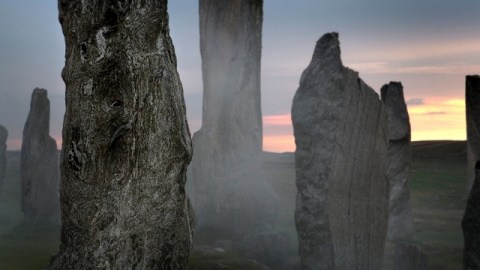Is David Eustace Scotland’s Secret Weapon?

Prison does things to a man, even if he gets to go home at the end of a long day of guarding the inmates. Scotland’s HM Prison Barlinnie features the same overcrowded conditions and gallows past of American prisons, but it also lays claim to one famous, rather than infamous, alumnus—photographer David Eustace. An exhibit of Eustace’s latest photos (part of “Scotland Week,” which runs from April 6 through 14, 2013, in New York City; Eustace’s exhibit runs only on the weekend from April 5 through 7) brings the Highland Heartto the heart of the Big Apple. Taken with the eye of someone who’s seen humanity at its lowest, Eustace’s photographs soaringly celebrate his native land’s stark, epic beauty, adding to his already remarkable body of portraiture of both celebrities and everyday people. For a country looking to advertise its uniqueness, David Eustace might just be Scotland’s secret weapon.
Eustace came to photography at the age of 27, after a working class childhood, leaving school at 16, serving in the Royal Navy, and working as a guard at the notorious “Bar-L.” On the strength of his portfolio of just one year’s work, Eustace returned to school at Edinburgh Napier University. Eustace epitomizes Napier’s Latin motto, Nisi sapientia frustra, which translates to “Everything is vain without knowledge.” For all the celebrity of some of his subjects, his portraits never seem like vanity projects. Sir Paul McCartney, Eustace’s most famous subject, looks pensive, casual, unguarded, and eternally boyish in Eustace’s photographs, but never vain and self-important. That same simplicity comes across in other portrait collections such as American Character, in which Eustace filmed “everyday” Americans in search of the essence of Americanness; The Buskers, in which Eustace captured street performers with a unique dignity belying their humble profession; and In Search of Eustace, the fascinating photographic essay detailing the photographer’s road trip with his teenage daughter in search of the young woman she was becoming as well as David’s personal quest to define his own role as a father.
Highland Hearttakes that same empathetic, knowing eye and creates a portrait of Scotland itself—stony, chilling, resilient, bold. A comparison with Eustace’s photography of America’s Yosemite Park invites obvious parallels, but also distinctive contrasts. Just as it’s easy to overplay Eustace’s personal history while talking of his photography, it’s easy to overplay the concept of national “character.” But Eustace’s Highland Hearttruly captures the human heart of Scotland, a land long languishing in the shadow of England with an ancient trail of tears and blood forever reminding them of the tragic past. In the image above from the series, the mute stones stand in an almost mystical fog at their feet like witnesses to the past awakening to a new, hope-filled dawn. It’s a Stonehenge of sorts, but Scottish and particular to that place and people.
“Scotland Week” is, of course, essentially about tourism, but tourism itself is about openness to different places and cultures. Eustace’s unconventional path to a photographic career and unlikely ascension to the first rank of global photographers gives him a unique perspective that informs every photo he takes, regardless of the subject. Americans typically suffer from acute myopia when it comes to viewing anything beyond our shores, but David Eustace’s Highland Heartmight just be the right prescription to correct that deficiency.
[Image:David Eustace, from the series Highland Heart.]
[Many thanks to Scotland.org for providing me with the image above and other materials related to “Scotland Week,” which runs from April 6 through 14, 2013, in New York City. David Eustace’s exhibit runs only from April 5 through 7, 2013.]





